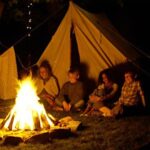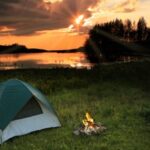by Liz Childers

You get home from a great camping trip, and you just want to relax. Unpacking your camping gear sounds like a huge chore. The longer you put it off, the less likely it is that you will ever get it done. We’ve all been there.
Unfortunately, not properly storing your gear can damage it. If you are gathering all your gear and discover your sleeping bag has a funky odor, the trip you are packing for could be ruined. And what if your tent developed a tiny tear while lying in the bottom of your closet but you didn’t notice it until it began to rain on your trip?
This is why it is worth it to store your gear properly and do it as soon as you get home. We promise – you won’t regret it!
Choose a good storage area
A good storage area is high off the ground and is dry. This could be a shed, somewhere in your garage, or in a closet. As long as it is on a shelf or, in some way, elevated, you will be able to lower the risk of insects or rodents getting into your gear. The space also needs to be dry to eliminate freezing or mildew.
Inventory List
Keep an inventory list of all your gear in your storage area. As you unpack, check items off the list. You can make notes of any gear that needs to be replenished or repaired; you may also want to write down what gear you wish you had not brought on the trip or the gear you wish you had taken with you. The inventory list is the starting point in the packing process, as well.
Make sure gear is clean and dry
Not only do you want the storage space to be dry, but your gear should be dry as well. If your storage area is any place without heating, you run the risk of your gear reaching freezing temperatures during cold months. Since water molecules expand when they freeze, wet gear may crack or tear. Even if there’s no chance of your gear freezing, it could mold or mildew if packed damp. Gear also needs to be free of food, food smells, and dirt. All of these items could attract rodents or mold that can damage gear.
Remove Batteries
To avoid corrosion, remove batteries from all electronics. Store the batteries separately. Keep them in a sealable, plastic bag to avoid condensation.
Store in groups
To make repacking easier, store your gear in groups. For example, keep your sleeping gear in one airtight, labeled box, and your cooking gear in another. Vacuum-sealed bags are also great storage options. Whenever you take anything to be prepared, be sure you return it to its proper storage location so you do not accidently forget it for your next trip.



